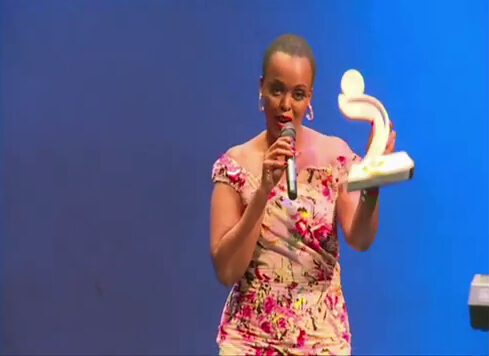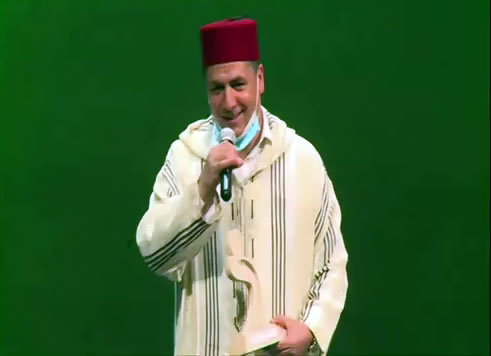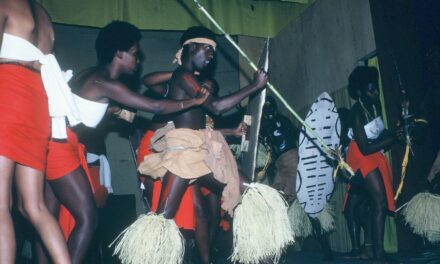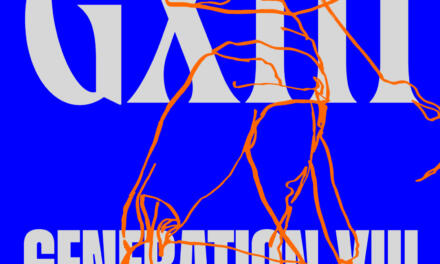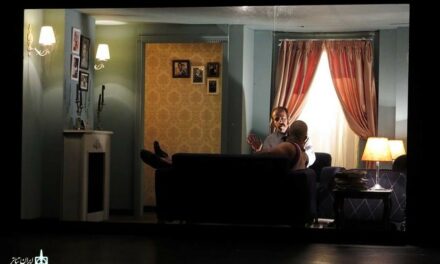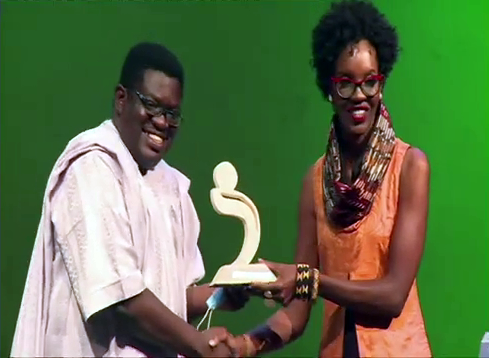
Sanaa Awards CEO George Orido (left) presents a trophy to Achie Ojany Alai, the Tourism, Sports, Arts & Culture Minister of Kisumu county. (Photo: Sanaa Awards)
The 2020 Sanaa Theatre Awards were held on 20th December took place at the Kenya Cultural Center, Nairobi. Given the challenges thrust upon the live events industry by the COVID-19 pandemic, it is a wonder that the award ceremony took place at all and was not virtual (although it was streamed live on Facebook). Many productions, including a slew of musicals, were canceled or indefinitely postponed in 2020 when the gov’t announced a raft of measures to mitigate the effects of the novel coronavirus that was first detected in Wuhan, China, in December 2019. Kenya International Theatre Festival also took place in 2020 but was scaled down, as compared to previous years. As of January 2020, Kenyan theatre is far from recovery and only time will tell if live theatre will return with vengeance or limp into the future.
Back to Basics theatre group emerged the big winner at the awards, which are Kenya’s version of the Tony’s) . Founded by veteran thespian Mbeki Mwalimu, Back to Basics raked up a total of 6 awards. They received accolades for Best Supporting Actress, Best Producer, Best Playwright, Best Set Light And Sound Design, Best Actress, and Best Production. Nick Ndeda (who is also a TV host and former radio presenter) penned the ‘most winning production, The Debate. In addition, the affable Mary Mwikali, another former TV host, scooped the Best Actress gong, for her performance in The Debate. The ceremony was presided over by the Principal Secretary Ministry of Sports and Heritage, Hon. Josephta Mukobe.
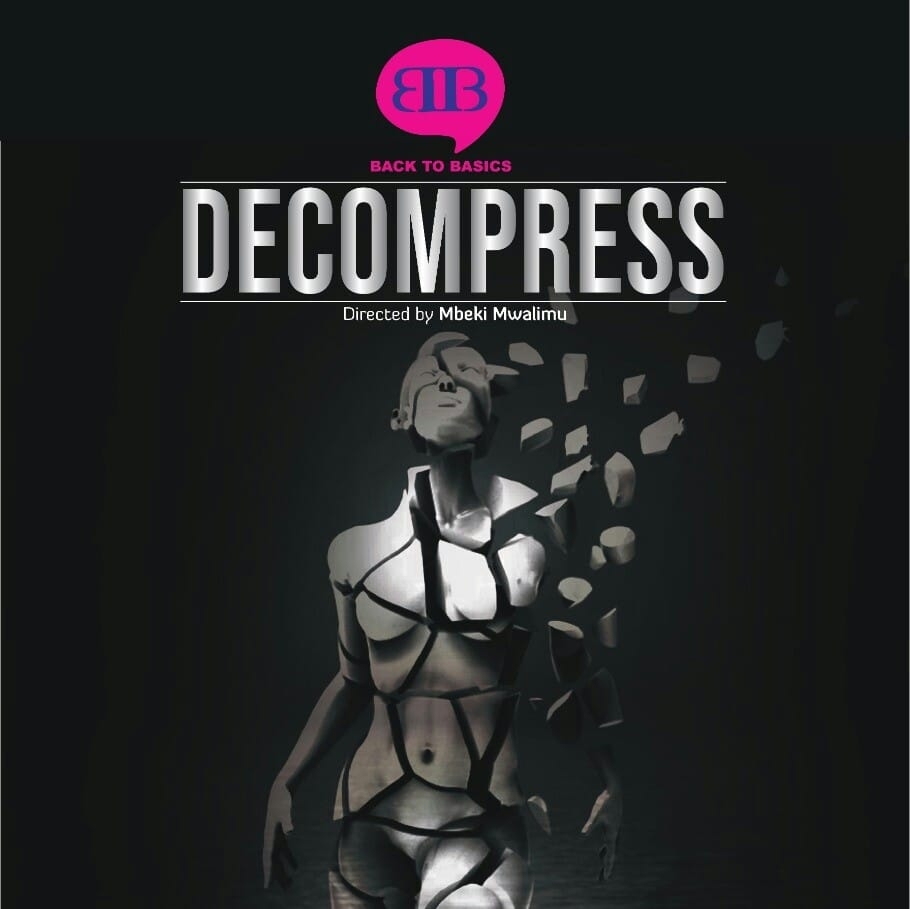
Speaking at the event, hyphenated artiste Mbeki Mwalimu said:
“In this industry, I think one of the biggest problems we have is taking our word out there, that we do exist as an industry that can actually employ people, and can be marketable, and we can do things and actually earn a living from this industry… The Ministry of Sports, Culture & Heritage should partner with the Ministry of Education and make sure that theatre is inculcated into every school-going kid. From primary school all the way to secondary school. Because what happens is that when people finish school, and come out here and go, like “Oh, what can I do? I can do theatre. Theatre can make me money. Theatre can take me places.” They’re literally starting from ground zero. But what id from primary school, people were told, “Go to the theatre”, the same way people go…to watch football every Saturday or every Sunday?”…Every kid should look forward to a theatre night…So when we (thespians) come here and perform, we’re not starting from ground zero to market our plays to people, and telling them, “Theatre is amazing, theatre is beautiful, we can tell our stories through theatre, we can pass our messages through theatre.” People come here knowing very well how powerful theatre is.”
More food for thought was served by H.E. Mokhtar Gambou, the Moroccan ambassador to Kenya. Towards the end of the show, he said:
“Culture is a vector of social transformation. In my country, we are also looking at it as a vector of economic transformation…We (Moroccans) attract about 13 million tourists a year. And half of those tourists actually come to Morocco because of culture…We have to stop think of culture just in terms – or even against – the European context…We have to also think about intra-Africa cultural development. We need to help each other. Because culture is one which kept us together. Colonialism in Morocco, just like in Kenya, was about to erase our memory. What saved our identity was that collective memory – in the marketplace, in the public squares, we were able to tell stories, jokes, theatre in all manner of traditional forms. This is what, kept us an African identity, independent. Culture is actually what gives us resistance, through which we have kept our history.”
Moroccan ambassador H.E. Mokhtar Gambou
And the winners were…
Without further ado, here’s the complete list of the 2020 Sanaa Theatre awardees and their respective productions.
1. Best Actor
Paul Ogolla – Good For Nothing
2. Best Actress
Mary Mwikali – The Debate
3. Best Actress in a Supporting Role
Maryanne Nungo – Decompress
4. Best Actor in a Supporting Role
Fischer Maina – Fish Out of Water
5. Best Director
Sammy Mwangi
6. Best Playwright
Nick Ndeda – The Debate
7. Best Set Light and Sound Design
Decompress – Back To Basics
8. Best Costumes
Nyanga – The Runaway Grandmother
9. Best Production
The Debate
10. Best Musical Theatre
Reke Mahike
11. Best Dance Theatre
Dance Into Space – Agwata
12. Best Spoken Word and Poetry – Rosa Parks Award
Kennet B – Pearl
13. Best Producer
Masuti Mwalimu
14. Best Theatre, Art and Culture Writer
Anthony Njagi, Nation Media Group
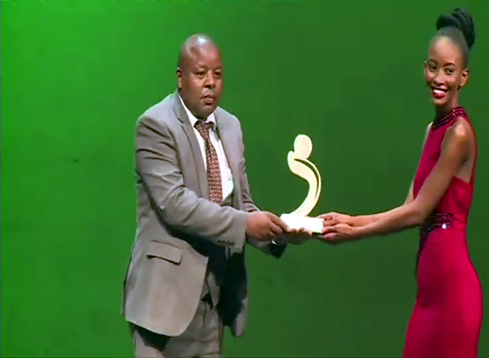
NMG writer Anthony Njagi (left) receives his accolade (Photo: Sanaa Theatre Awards)
15. Best Supporting County
Kisumu County Government
16. Best Art and Culture Magazine / Newspaper
The Nairobian
17. Best All-time Supporting Institution
Permanent Presidential Music Commission
18. Best Supporting Individual
Michael Pundo, Ag. CEO Kenya Cultural Centre
19. Best Performing Theatre Space
Alliance Francaise, Nairobi
20. Most Improved Theatre Space
Mama Grace Onyango Social Centre, Kisumu
21. Lifetime Achievement Award
• Sammy Mwangi
• Lydia Gitachu
• Caroline Midimo
• Chris Mutungi
• Sam Psenjen
• Sulaiman Fadhili
• Keith Pearson
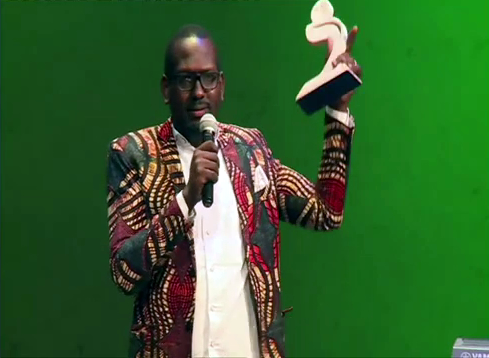
Sam Psenjen was one of 7 Lifetime Achievement Award awardees (Photo: Sanaa Theatre Awards)
28. Best Narrative Theater
George Chunga – Ondiek Marach
29. Best Live Music Performance – Daniel Pearl Award
Atis Sanna
30. Distinguished Diaspora Award Owiso Odera Award
Jabali Afrika
31. Distinguished Adjudicators Award
Christmas Cantata in Kenya Sign language
32. Special Recognition in Cultural Diplomacy
HE Ambassador Mokhtar Gambou
This post was written by the author in their personal capacity.The opinions expressed in this article are the author’s own and do not reflect the view of The Theatre Times, their staff or collaborators.
This post was written by Alexander Nderitu.
The views expressed here belong to the author and do not necessarily reflect our views and opinions.

